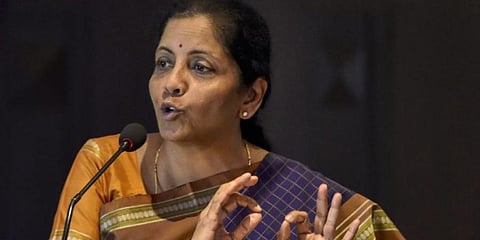

The discourse on the state of the economy has always been raucous in India. The narrative has now acquired a surreal facet and tone. For weeks now, the government of India and state governments have been dodging and weaving arguments on the quantum of losses and the obligation of compensation. The chief minister of Chhattisgarh declared states have not received a single paisa since April 1. The Centre, on its part, produced a legal opinion stating it was not legally obliged to compensate — this, amidst evangelism of cooperative federalism. The deputy chief minister of Bihar, where the BJP is in power in a coalition, informed the Centre of its ‘moral obligations’.
When the issue came up at the 41st GST Council Meeting on Friday, Finance Minister Nirmala Sitharaman introduced the celestial factor. Illuminating the state of the economy, she said, “This year we are facing an extraordinary situation…we are facing an act of God which might even result in the contraction of the economy.” The invocation of the escape clause from the insurance industry was trolled within minutes from within the party and outside. Subramaniam Swamy asked whether the slowdown of the previous eight quarters was an act of God while West Bengal Finance Minister Amit Mitra simply said “God save this government”.
Beyond the rhetoric, the construct is problematic at many levels — to start with subscription to omnipotence of the unseen equally demands acceptance of divine benevolence. Critically, the genesis of the virus which has caused the pandemic is yet unclear – questions on whether it was sue generis, an immaculate conception or created in a laboratory in China or elsewhere are as yet unanswered.
The postulate also constrains scientific interrogation and confuses correlation with causation — sequentially the contraction in the economy is the consequence of the lockdown imposed by the government.
The finance minister also went on to aver that the Act which enabled the GST did not foresee ‘an Act of God’. It is arguable that the ‘grand bargain’, which saw the introduction of GST in 2017, is flawed. In the run up to the introduction of ‘One Nation One Tax’, this column urging for a tax neutral regime, argued that states cannot dictate rates and expect compensation at the same time. It was akin to having the cake and eating it too. The government defended its stance then by stating that the ‘best’ cannot be the enemy of the ‘good’. The perceived ‘good’ now appears to be a bad deal. In 2020, the Centre finds itself locked in a binding obligation it can scarcely escape from.
By its own admission, the Centre owes states over Rs 1.5 lakh crore for the first four months of the financial year and may have to fork out over Rs 3 lakh crore for the full year. There is no disputing the criticality of resources for states. Every square kilometre of India — unless it is a Union Territory — is administered by states. The data on total government expenditure illustrates this eloquently — in 2019, total expenditure of the Centre was Rs 24.4 lakh crore while that of the states was Rs 35.5 lakh crore.
States governments are on the frontline of the war against the pandemic — critical to the preservation of the economy and for growth. Across India there are over 2 million vacant posts — in health, police and education — vital to sustaining governance. States are tasked with addition of community health centres and paramedics, anganwadi workers as specified by the NEP 2020 and provision of drinking water. The structural circumstance of governance calls for a policy promising efficient resource management.
The finance ministry is reluctant to making good the gap from its own coffers or borrowing against its own balance sheet. It has suggested that states could borrow the entire shortfall from the markets or a part of it through a special window facilitated by Reserve Bank of India. The solutions proposed are inefficient to say the least. The suggestion asking states to borrow from the market what the Centre owes the state is jalebi economics.
Ordinarily, these monies would have flowed from the Centre’s coffers. The cost of borrowing is lower for the Centre than for the states. What is the logic of adding higher interest costs to the cost of governance? Ostensibly, the attempt is to keep the Centre’s deficit and borrowings down. But no amount of showboating can camouflage reality — borrowings whether by the Centre or the states will show up on public debt data.
The reality is that India migrated from eight quarters of slowdown to lockdown. Need for money — for recapitalising banks, for unpaid dues, for rising social subsidies — will follow requiring the Centre to knock on the doors of debt and deficit. There are options. The government can hive off holdings in Public Sector Enterprises (PSEs) and Life Insurance Corporation into a sovereign fund, India Investment Corporation. The underlying value can be leveraged to issue bonds to wealth funds, pension funds and HNIs and followed by the phased sale of entities.
Atmanirbhar India calls for innovation in raising resources. Why not knock on the temples of modern India as the moolah mantra to overcome the Act of God?
Shankkar Aiyar
Author of The Gated Republic, Aadhaar: A Biometric History of India’s 12 Digit Revolution, and Accidental India shankkar.aiyar@gmail.com